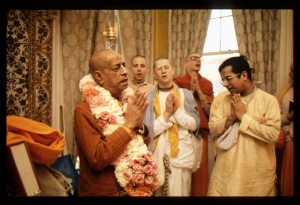CC Madhya 15.270 (1975): Difference between revisions
(Vanibot #0027: CCMirror - Mirror CC's 1996 edition to form a basis for 1975) |
(Vanibot #0020: VersionCompareLinker - added a link to the Version Compare feature) |
||
| Line 2: | Line 2: | ||
<div style="float:left">'''[[Sri Caitanya-caritamrta (1975)|Śrī Caitanya-caritāmṛta (1975)]] - [[CC Madhya (1975)|Madhya-līlā]] - [[CC Madhya 15 (1975)|Chapter 15: The Lord Accepts Prasādam at the House of Sārvabhauma Bhaṭṭācārya]]'''</div> | <div style="float:left">'''[[Sri Caitanya-caritamrta (1975)|Śrī Caitanya-caritāmṛta (1975)]] - [[CC Madhya (1975)|Madhya-līlā]] - [[CC Madhya 15 (1975)|Chapter 15: The Lord Accepts Prasādam at the House of Sārvabhauma Bhaṭṭācārya]]'''</div> | ||
<div style="float:right">[[File:Go-previous.png|link=CC Madhya 15.269 (1975)|Madhya-līlā 15.269]] '''[[CC Madhya 15.269 (1975)|Madhya-līlā 15.269]] - [[CC Madhya 15.271 (1975)|Madhya-līlā 15.271]]''' [[File:Go-next.png|link=CC Madhya 15.271 (1975)|Madhya-līlā 15.271]]</div> | <div style="float:right">[[File:Go-previous.png|link=CC Madhya 15.269 (1975)|Madhya-līlā 15.269]] '''[[CC Madhya 15.269 (1975)|Madhya-līlā 15.269]] - [[CC Madhya 15.271 (1975)|Madhya-līlā 15.271]]''' [[File:Go-next.png|link=CC Madhya 15.271 (1975)|Madhya-līlā 15.271]]</div> | ||
{{CompareVersions|CC|Madhya 15.270|CC 1975|CC 1996}} | |||
{{RandomImage}} | {{RandomImage}} | ||
==== TEXT 270 ==== | ==== TEXT 270 ==== | ||
| Line 27: | Line 26: | ||
<div class="translation"> | <div class="translation"> | ||
" 'When a person mistreats great souls, his life span, opulence, reputation, religion, possessions and good fortune are all destroyed.' | |||
</div> | </div> | ||
| Line 34: | Line 33: | ||
<div class="purport"> | <div class="purport"> | ||
This statement | This is a statement made by Śukadeva Gosvāmī, who was relating Śrīmad-Bhāgavatam (10.4.46) to Mahārāja Parīkṣit. This quotation concerns the attempted killing of Kṛṣṇa's sister (Yogamāyā), who appeared before Kṛṣṇa's birth as the daughter of mother Yaśodā. This daughter Yogamāyā and Kṛṣṇa were born simultaneously, and Vasudeva replaced Kṛṣṇa by taking Yogamāyā away. When she was brought to Mathurā and Kaṁsa attempted to kill her, Yogamāyā slipped out of his hands. She could not be killed. She then informed Kaṁsa about the birth of his enemy, Kṛṣṇa, and being thus baffled, Kaṁsa consulted his associates, who were all demons. When this big conspiracy was taking place, this verse was spoken by Śukadeva Gosvāmī. He points out that a demon can lose everything because of his nefarious activities. | ||
The word mahad-atikramaḥ, meaning "envy of Lord Viṣṇu and His devotees," is significant in this verse. The word mahat indicates a great personality, a devotee or the Supreme Personality of Godhead Himself. Being always engaged in the | |||
Lord's service, the devotees themselves are as great as the Supreme Personality of Godhead. The word mahat is also explained in Bhagavad-gītā ([[BG 9.13 (1972)|BG 9.13]]): | |||
:mahātmānas tu māṁ pārtha | |||
:daivīṁ prakṛtim āśritāḥ | |||
:bhajanty ananya-manaso | |||
:jñātvā bhūtādim avyayam | |||
"O son of Pṛthā, those who are not deluded, the great souls, are under the protection of the divine nature. They are fully engaged in devotional service because they know Me as the Supreme Personality of Godhead, original and inexhaustible." | |||
Being envious of the Lord and His devotees is not at all auspicious for a demon. By such envy, a demon loses everything considered beneficial. | Being envious of the Lord and His devotees is not at all auspicious for a demon. By such envy, a demon loses everything considered beneficial. | ||
</div> | </div> | ||
Latest revision as of 09:15, 27 January 2020

A.C. Bhaktivedanta Swami Prabhupada
TEXT 270
- āyuḥ śriyaṁ yaśo dharmaṁ
- lokān āśiṣa eva ca
- hanti śreyāṁsi sarvāṇi
- puṁso mahad-atikramaḥ
SYNONYMS
āyuḥ—duration of life; śriyam—opulence; yaśaḥ—reputation; dharmam—religion; lokān—possessions; āśiṣaḥ—benedictions; eva—certainly; ca—and; hanti—destroys; śreyāṁsi—good fortune; sarvāṇi—all; puṁsaḥ—of a person; mahat—of great souls; atikramaḥ—violation.
TRANSLATION
" 'When a person mistreats great souls, his life span, opulence, reputation, religion, possessions and good fortune are all destroyed.'
PURPORT
This is a statement made by Śukadeva Gosvāmī, who was relating Śrīmad-Bhāgavatam (10.4.46) to Mahārāja Parīkṣit. This quotation concerns the attempted killing of Kṛṣṇa's sister (Yogamāyā), who appeared before Kṛṣṇa's birth as the daughter of mother Yaśodā. This daughter Yogamāyā and Kṛṣṇa were born simultaneously, and Vasudeva replaced Kṛṣṇa by taking Yogamāyā away. When she was brought to Mathurā and Kaṁsa attempted to kill her, Yogamāyā slipped out of his hands. She could not be killed. She then informed Kaṁsa about the birth of his enemy, Kṛṣṇa, and being thus baffled, Kaṁsa consulted his associates, who were all demons. When this big conspiracy was taking place, this verse was spoken by Śukadeva Gosvāmī. He points out that a demon can lose everything because of his nefarious activities.
The word mahad-atikramaḥ, meaning "envy of Lord Viṣṇu and His devotees," is significant in this verse. The word mahat indicates a great personality, a devotee or the Supreme Personality of Godhead Himself. Being always engaged in the
Lord's service, the devotees themselves are as great as the Supreme Personality of Godhead. The word mahat is also explained in Bhagavad-gītā (BG 9.13):
- mahātmānas tu māṁ pārtha
- daivīṁ prakṛtim āśritāḥ
- bhajanty ananya-manaso
- jñātvā bhūtādim avyayam
"O son of Pṛthā, those who are not deluded, the great souls, are under the protection of the divine nature. They are fully engaged in devotional service because they know Me as the Supreme Personality of Godhead, original and inexhaustible."
Being envious of the Lord and His devotees is not at all auspicious for a demon. By such envy, a demon loses everything considered beneficial.